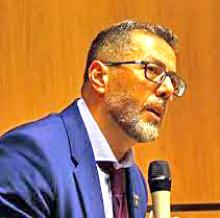You are here
Time to correct the language of history
Nov 16,2022 - Last updated at Nov 16,2022
At a recent Istanbul conference that brought many Palestinian scholars and activists together to discuss the search for a common narrative on Palestine, a Palestinian member of the audience declared at the end of a brief, but fiery intervention, “we are not red Indians”.
The reference was a relatively old one. It was attributed to former Palestinian leader Yasser Arafat during an interview in his office in Ramallah where he was forcefully confined and surrounded, two years earlier, by the Israeli military that had re-invaded the populous Palestinian city. In the interview, the head of the PLO and president of the Palestinian Authority (PA) said that, despite Israel’s attempt at eradicating the Palestinian people, they remain steadfast. Israel had “failed to wipe us out”, Arafat said, adding, “We are not red Indians.”
Though Arafat’s intention was not to degrade or insult Native American communities, the statement, often taken out of context, hardly reflects the deep solidarity between Palestinians and national liberation struggles, including indigenous struggles around the world. Ironically, Arafat, more than any Palestinian leader, has forged ties with numerous communities in the Global South and in fact all over the world. A generation of activists had linked Arafat to their initial awareness, then involvement in Palestine solidarity movements.
What surprised me is that the comment on Palestinians not being “red Indians” in Istanbul was quoted repeatedly and, occasionally, solicited applause from the audience, which only stopped when the convener of the conference, a well-regarded Palestinian professor, declared frustratingly, “they are neither ‘red’ nor Indians”. Indeed, they are not. Actually, they are the natural allies of the Palestinian people, like numerous indigenous communities, who have actively supported the Palestinian struggle for freedom.
The seemingly simple incident or poor choice of words, however, represents a much greater challenge facing Palestinians as they attempt to reanimate a new discourse on Palestinian liberation that is no longer hostage to the self-serving language of the PA elites in Ramallah.
For several years, a new generation of Palestinians has been fighting on two different fronts: against Israel’s military occupation and apartheid, on the one hand, and PA repression on the other. For this generation to succeed in reclaiming the struggle for justice, they must also reclaim a unifying discourse, not only to reconnect their own fragmented communities throughout historic Palestine, but also re-establish solidarity lines of communication across the globe.
I say “reestablish”, because Palestine was a common denominator among many national and indigenous struggles in the Global South. This was not a random outcome. Throughout the 1950s, 60s and 70s, fierce wars of liberation were fought across continents, leading in most cases to the defeat of traditional colonial powers and, in some cases like Cuba, Vietnam and Algeria, to true decolonisation. With Palestine being a compounded case of western imperialism and Zionist settler colonialism, the Palestinian cause was embraced by numerous national struggles. It was, and remains, a most raw example of western supported ethnic cleansing, genocide, apartheid, hypocrisy but also inspiring indigenous resistance.
PLO factions, intellectuals and activists were known and respected worldwide as ambassadors to the Palestinian cause. Three years following his assassination by the Israeli Mossad in a Beirut car bombing, Palestinian novelist Ghassan Kanafani was awarded posthumously the Annual Lotus Prize for Literature by the Union of Asian and African Writers as a delineation of the common struggle between peoples of both continents. Not only has Palestine served as a physical connection between Asia and Africa, it has also served as an intellectual and solidarity connection.
Arab countries, which also fought their own painful but heroic national liberation wars, played a major role in the centrality of Palestine in the political discourses of African and Asian countries. Many non-Arab countries supported collective Arab causes, especially Palestine, at the United Nations, pushed for the isolation of Israel, backed Arab boycotts and even hosted PLO offices and fighters. When Arab governments began changing their political priorities, these nations, sadly but unsurprisingly, followed suit.
The massive geopolitical changes after the Cold War, in favor of the US-led Western camp, profoundly and negatively impacted Palestine’s relations with the Arab and the rest of the world. It also divided the Palestinians, localising the Palestinian struggle in a process that seemed to be determined mostly by Israel alone. Gaza was placed under a permanent siege, the West Bank was splintered by numerous illegal Jewish settlements and military checkpoints, Jerusalem was swallowed whole and Palestinians in Israel became victims of a police state that defined itself primarily on racial grounds.
Abandoned by the world and their own leadership, oppressed by Israel and bewildered by remarkable events beyond their control, some Palestinians turned against one another. This was the age of factionalism. However, Palestinian factionalism is bigger than Fateh and Hamas, Ramallah and Gaza. Equally dangerous to the self-serving politics are the numerous provisional discourses that it espoused, neither governed by any collective strategy or an inclusive national narrative.
When the PLO was ousted from Lebanon following the Israeli invasion and deadly war, the nature of the Palestinian struggle transformed. Headquartered in Tunisia, the PLO was no longer able to present itself as a leader of a liberation movement in any practical sense. The Oslo Accords of 1993 resulted from this political exile and subsequent marginalization. It also accentuated an existing trend where an actual war of liberation turned into a corporate form of liberation, hunger for funds, false status and, worse, a negotiated surrender.
This much is now familiar and acknowledged by many Palestinians. Less discussed, however, is that nearly forty years of this process left Palestinians with a different political discourse than that which existed for decades prior to Oslo.
Undoubtedly, Palestinians are aware of the need for a new liberated language. This is not an easy task, nor is it a randomly generated process. The indoctrination that resulted from the Oslo culture, the factional language, the provincial political discourse of various Palestinian communities, left Palestinians with limited tools through which to express the priorities of the new era. Unity is not a political document. Neither is international solidarity. It is a process that is shaped by a language which should be spoken collectively, relentlessly and boldly. In this new language, Palestinians are Native Americans, not in their supposed propensity to be “wiped out”, but in their pride, resilience and continued quest for equality and justice.
Ramzy Baroud is a journalist, author and the editor of The Palestine Chronicle. He is the author of six books. His latest book, co-edited with Ilan Pappé, is “Our Vision for Liberation: Engaged Palestinian Leaders and Intellectuals Speak out”. His other books include “My Father was a Freedom Fighter” and “The Last Earth”. Baroud is a non-resident senior research fellow at the Centre for Islam and Global Affairs (CIGA). His website is












